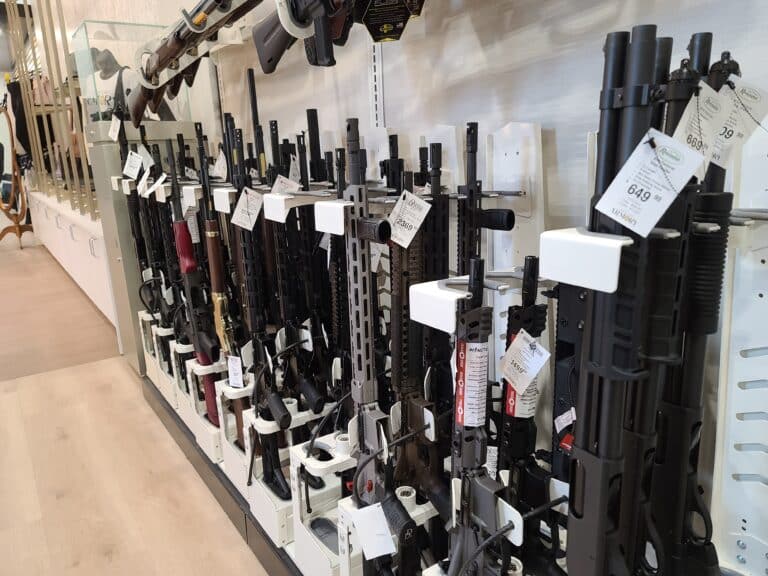Tennessee Governor Bill Lee (R.) has gone to great lengths to say his order of protection proposal is unlike so-called red flag laws. But how different is his preferred policy from current examples?
On Monday, Lee formally announced a special legislative session beginning August 21st dedicated to legislation aimed at preventing mass shootings. While not exclusively so, the session will likely center around his take on legislation aimed at temporarily taking guns from those determined to be a threat to themselves or others.
“After speaking with members of the General Assembly, I am calling for a special session on August 21 to continue our important discussion about solutions to keep Tennessee communities safe and preserve the constitutional rights of law-abiding citizens,” Lee said. “There is broad agreement that action is needed, and in the weeks ahead, we’ll continue to listen to Tennesseans and pursue thoughtful, practical measures that strengthen the safety of Tennesseans, preserve Second Amendment rights, prioritize due process protections, support law enforcement and address mental health.”
Lee is attempting to walk a fine line politically. Being perceived as calling for gun control in an overwhelmingly Republican state risks alienating gun-rights supporters and right-leaning voters more broadly. That’s why he is attempting to control the narrative around what his proposal actually is, drawing sharp contrasts with commonly understood “red flag” laws adopted in other states.
Now that a draft proposal of Lee’s policy has been released, it’s worth looking at how different Lee’s proposal truly is compared with the red flag confiscation orders passed elsewhere.
Current “Red Flag” Laws
Thus far California, Colorado, Connecticut, Delaware, the District of Columbia, Florida, Hawaii, Illinois, Indiana, Maryland, Massachusetts, New Jersey, New Mexico, New York, Nevada, Oregon, Rhode Island, Washington, Vermont, and Virginia have enacted “red flag” laws. Additionally, the Michigan legislature passed a “red flag” law last month that is currently awaiting Governor Gretchen Whitmer’s signature (D.).
While it can be difficult to generalize, given that the statutes vary in their specifics from one state to the next, these policies follow a common pattern. Most often, the laws function by allowing a person—generally law enforcement and family members, though sometimes others depending on the state—to file a petition with a court requesting a protection order against an individual deemed to pose a dangerous risk to themselves or others.
An initial decision to confiscate the subject’s guns is typically made ex parte, meaning the person subject to the petition is not present at the hearing or even aware of its existence. Law enforcement can then immediately seize the person’s guns. The initial orders typically last for around two weeks, or until a hearing is held on a final order. The bar of proof at the ex parte hearing tends to be lower in most states as well, requiring only that a petitioner show “probable,” “good,” or “reasonable” cause for an initial order to be granted.
In most states, respondents are not provided with a court-appointed defense attorney at the final hearing and, in many cases, are not allowed to cross-examine their accusers. Final orders are typically granted under higher evidentiary standards, either “preponderance of the evidence” or “clear and convincing” standards. If granted, they usually last up to one year with the option to extend after subsequent proceedings.
Most red flag statutes do not contain civil protections against falsely or maliciously filed red flag petitions. Some also do not contain specific language streamlining the process for respondents to retrieve their previously seized firearms once the order expires or after they’ve been found not to be a threat.
Furthermore, most existing red flag statutes are exclusively concerned with removing the ability of an unstable individual to purchase or possess firearms. They do not extend toward treating the underlying mental or behavioral health issues that prompted a red flag order to be issued in the first place.
Many gun-rights supporters and certain civil liberties advocates have charged that the process outlined above does not contain adequate due process protections for persons subject to red flag proceedings. In particular, critics have taken aim at the ex parte nature of most proceedings, the low bar of proof required in granting the petitions, and the heightened risk of violent law enforcement encounters created by a process that encourages police seizures of firearms from either potentially unstable individuals or unwitting innocent gun owners in the case of unwarranted petitions.
That is why many gun rights advocates and, by extension, conservative voters have come to treat red flag laws with suspicion or hostility.
Lee’s Proposal
Governor Lee has attempted to craft his proposal to address a number of the due process concerns commonly expressed against other red flag laws. Notably, he has even avoided calling his proposal a red flag law, though it’s aimed at a similar purpose.
Under the draft proposal of Lee’s “mental health order of protection” policy, only members of law enforcement would be permitted to file a petition with a court. Members of the public would be able to bring concerns over an individual to the attention of law enforcement, but they would not be permitted to initiate the proceedings themselves. Only Florida, Indiana, New Mexico, and Rhode Island are similarly limited in this regard.
All filed petitions must be accompanied by a sworn statement providing specific evidence of the risk posed by an individual covered under the petition. Once a petition is filed, a court must notify the respondent of the petition within five days of its filing and must hold a hearing within ten days. The accused party would be subject to a mandatory assessment for suicidal or homicidal ideation prior to the hearing. Respondents would be given the option of court-appointed legal counsel, and they would be provided the opportunity to present their own evidence and cross-examine any witness at the court hearing.
Orders would be granted under a single “clear and convincing” evidentiary standard and would be valid for up to 180 days, with the option to extend only after an additional court hearing. Following a granted order, a gun-owning respondent would have 48 hours to relinquish their firearms and ammunition either to the police or a third party who is not prohibited from possessing firearms. The respondent would be required to sign an affidavit certifying their dispossession and would then be required to attend available mental health treatment, including “counseling programs that address violence and
control issues, anger management, or substance abuse problems.”
Lee’s proposal also includes criminal and civil penalties for persons who knowingly file false petitions for mental health orders, including charges of aggravated perjury and a cause of action to secure “compensatory damages, punitive damages, attorney fees, and costs.”
In other words, the Lee proposal would do away with the ex parte nature of other red flag laws by only holding one hearing featuring both parties to the case, it would provide guaranteed legal defense to the accused free of charge, it would feature protection orders of a shorter duration than other statutes, it would create criminal and civil disincentives for malicious orders, and it would create an avenue for the voluntary dispossession of firearms to third parties to avoid hostile police confrontations created by granted orders. It would also attempt to begin the process of addressing the underlying mental health problems that prompted the petition in the first place.
Whether these included features are enough to convince the supermajority Republican Tennessee General Assembly to go along with the Governor in embracing this policy remains to be seen. It certainly hasn’t been enough to dissuade multiple gun-rights groups from opposing his proposal, most of which remain adamantly opposed to any red flag-style law on principle.
But it is clear that Lee’s proposed order of protection measure is the first to take many of the typical due process concerns around red flag laws seriously by building safeguards into the policy’s language. And for that reason, it could be the most interesting test case for how much room red flag-style laws have to grow moving forward.







2 Responses
This is less harmful – but not good enough. If the focus is on mental health, and if a person is reasonably truly a safety risk to the community, then they should not have access to firearms. Agreed. And they should not have access to knives. or gasoline. Or motor vehicles. Or baseball bats.
There is no reason to limit the restrictions to firearms. If a person is reasonably truly a safety risk to the community, then the only responsible course of action is to take them out of the community – that eliminates the risk they pose – and place them into protective custody for observation, evaluation. This protects the community, and it protects themselves.
It also places the focus on mental health and wellness, and takes the focus off of one of the many tools (firearms) that some people, unfortunately, use to hurt others.
Cam Edwards made this point on the podcast this week. You should check out the whole episode if you haven’t already. I think you’ll agree with much of what he argued. https://thereload.com/podcast-examining-tennessees-red-flag-proposal-trumps-bump-stock-defense-with-bearing-arms-cam-edwards/